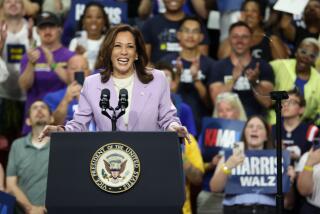Jones Seeks Quick Start Against Boxer
Hoping to raise his profile with voters, Republican U.S. Senate nominee Bill Jones joined President Bush’s California tour Wednesday to launch his campaign against Democratic incumbent Barbara Boxer.
The appearances could deliver more visibility for Jones in two days than he has had in the last two months as he campaigned in the Republican primary, which he won Tuesday.
The joint appearances were expected to help erase lingering resentment among some Republican activists that Jones yanked his endorsement of Bush in 2000 for U.S. Sen. John McCain (R-Ariz.), then returned to Bush when McCain failed to win the California primary.
Jones’ campaign officials said they were thrilled to have their candidate touring with Bush. They said the nearly assured matchup between Bush and Massachusetts Sen. John F. Kerry would give the Senate race greater visibility.
“Just as the president will take on Kerry’s record of being the most extreme liberal senator in the country, we will have a similar message regarding Barbara Boxer,” Jones strategist Sean Walsh said. “Barbara Boxer and John Kerry are twins of the U.S. Senate regarding being extreme and out of touch with average Californians.”
Duf Sundheim, chairman of the California GOP, said the Jones-Boxer showdown is “the most difficult race we face, but it’s winnable.”
Jones offered a list of Democrats -- Boxer, Kerry, U.S. Sens. Edward M. Kennedy of Massachusetts and Hillary Rodham Clinton of New York -- who he said represent the party’s liberal wing and not a majority of voters. “California is a much more centrist state,” he said.
As of last week, Jones had raised about $1 million for his race, not including a $350,000 loan to himself, compared with nearly $10 million for Boxer. Jones had virtually nothing left; she had about $5.3 million in cash as of mid-February.
The contest is viewed as a main event for Democrats eager to soothe the sting of Gov. Gray Davis’ recall, state Democratic Party Chairman Art Torres said. A Boxer victory is a top priority for the state party, he said, as is electing Kerry president. Democrats represent 43% of California’s registered voters; 36% are Republicans and 16% decline to state a party.
“She’s our pride here in California,” Torres said of Boxer. “But people all over the country count on her to lead fights about the environment, guns and a woman’s right to choose.”
In an interview Tuesday, Boxer said she and Jones were at odds on issues ranging from guns to offshore oil drilling to the economy. “I think what we’re looking at here is a very clear choice for the voters,” she said.
She touted her support for child safety locks, contrasting it with what she described as Jones’ past opposition. She and her supporters also noted her vote Tuesday to extend a ban on assault weapons.
“My opponent Bill Jones had the chance to ban assault weapons ... but he voted no -- not once, but seven times,” Boxer told supporters during a Tuesday night call from Washington.
Sundheim, the state GOP chairman, said the issues most relevant to Californians have changed since 1998, in a post-9/11 world. National security and funding the intelligence community, as well as the war in Iraq and the campaign against terrorism, are more important than the issues Boxer used in 1992 and 1998 -- abortion, gun control and the environment -- to portray herself to voters as more reasonable and mainstream.
Jones’ campaign also hopes to draw on the popularity of the state’s celebrity governor, Arnold Schwarzenegger, who endorsed Jones early in the race but spent most of it campaigning for two initiatives that passed overwhelmingly Tuesday.
U.S. Sen. George Allen of Virginia, chairman of the National Republican Senatorial Committee, waded in Wednesday, issuing a statement that last year’s recall of Davis and the election of Schwarzenegger “energized and revitalized Republican and independent-minded voters throughout California.”
Jones said he would target voters likely to oppose Boxer’s voting record and values.
This may be the year that Boxer must explain to voters why she -- as a member of the minority party in the Senate -- doesn’t get more done, political analyst Sherry Bebitch Jeffe said: “She’ll need to educate voters of the reality of being in the minority.”
Jeffe, a political science professor at USC, said the Boxer-Jones match is a classic liberal-versus-conservative race. Boxer has been here before, running against commentator Bruce Herschensohn in 1992 and former state Treasurer Matt Fong in 1998 -- two candidates who suffered from comparisons with the more vivacious Boxer.
But Jeffe cited demographics, voter registration, the increased influence of women in the electorate as advantages for Boxer. She noted that Jones, particularly on social issues, holds positions that are at odds with a majority of Californians.
“We’ll know from the outcome of the race how real the vaunted resurgence of the Republican Party is in this state,” she said. “It will also be a good indicator of the influence of moderate swing voters, but at this point, the race is Barbara Boxer’s to lose.”
More to Read
Get the L.A. Times Politics newsletter
Deeply reported insights into legislation, politics and policy from Sacramento, Washington and beyond. In your inbox three times per week.
You may occasionally receive promotional content from the Los Angeles Times.










